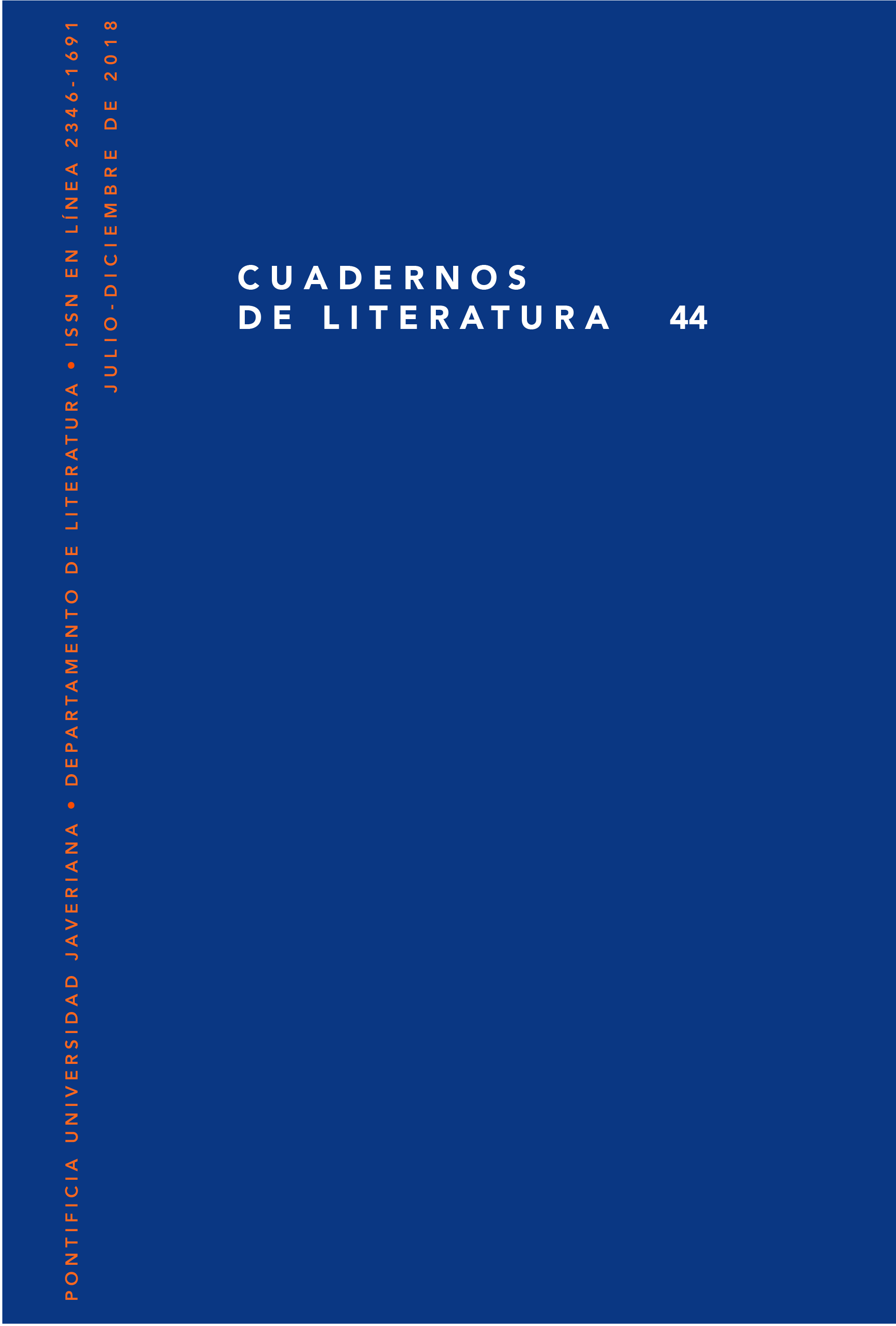Abstract
This paper studies the multiple relations between the cinema and the contemporary argentine literature from the sociocultural point of view and from the aesthetics that emerge, in a broad sense, between both spaces. This text warns that actions in the field tend to constitute a common territory, in which, progressively, disarms the idea of the passage, the presence of the writer in the process of writing, and the obligatory direction literature/films. On the aesthetic level, the bond between both is more complex and paradoxical. The relationship is affirmed as the literature and the cinema work complementing each other, crossing each other and incorporating improper elements.
Aguilar, Gonzalo. Otros mundos. Un ensayo sobre el nuevo cine argentino. Buenos Aires: Santiago Arcos, 2010. Impreso.
Aira, César. La guerra de los gimnasios. Buenos Aires: Emecé, 1993. Impreso.
Aira, César. La prueba. Buenos Aires: Grupo Editor Latinoamericano, 1992. Impreso.
Andermann, Jens. El nuevo cine argentino. Buenos Aires: Paidós, 2015. Impreso.
Bernini, Emilio, Domin Choi y Daniela Goggi. “Los no realistas. Conversación con Ezequiel Acuña, Diego Lerman y Juan Villegas”. Kilómetro 111 5 (Buenos Aires, noviembre de 2004): 163-169. Impreso.
Bottone, Mireya. La literatura argentina y el cine. Santa Fe: Universidad Nacional del Litoral, 1964. Impreso.
Casas, Fabián. Ocio seguido de Veteranos del pánico. Buenos Aires: Santiago Arcos, 2008. Impreso.
Cernadas, Jorge. “Notas sobre la desintegración del consenso antiperonista en el campo intelectual: Sur, 1955-1960”. Cultura y política en los años ’60. Coord. Enrique Oteiza. Buenos Aires: Instituto de Investigaciones “Gino Germani”, Facultad de Ciencias Sociales, Universidad Nacional de Rosario, 1997. 133-149. Impreso.
Contreras, Sandra. Las vueltas de César Aira. Rosario: Beatriz Viterbo, 2002. Impreso.
Couselo, Jorge. “Literatura argentina y cine nacional”. Capítulo. La historia de la literatura argentina. Buenos Aires: CEAL, 1981. 601-624. Impreso.
Di Benedetto, Antonio. Los suicidas. Buenos Aires: CEAL, 1982. Impreso
España, Claudio, dir. Cine argentino. Modernidad y vanguardias 1957- 1983. Buenos Aires: Fondo Nacional de las Artes, 2005. Impreso.
España, Claudio. “Emergencia y tensiones en el cine argentino de los años cincuenta”. Nuevo Texto Crítico X (1997): 45-73. Impreso.
Fontana, Patricio. “Martín Rejtman. Una mirada sin nostalgias”. Milpalabras 4 (Buenos Aires, primavera de 2002): 81-88. Impreso.
Foster, Hal. El retorno de lo real. La vanguardia a finales de siglo. Madrid: Akal, 2001. Impreso.
Gaudreault, André y Francois Jost. El relato cinematográfico. Cine y narratología. Barcelona: Paidós, 1995. Impreso.
Guerschuny, Hernán y Pablo Udenio. “Cinéfilo es una palabra rara”. Haciendo Cine 5 (Buenos Aires, octubre de 1996): 32-37. Impreso.
Kohan, Martín. Ciencias Morales. Barcelona: Anagrama, 2007. Impreso.
Malba.cine. “La guerra de los gimnasios”. N.p., n.d. http://intranet.malba.org.ar/ web/cine_pelicula.php?id=1255&subseccion=peliculas_proyectadas. Web.
Noriega, Gustavo. “La película del X Bafici: Historias extraordinarias, de Mariano Llinás”. elamante.com (23 de marzo de 2010). http://web.archive.org/ web/20111112031944/http://www.elamante.com/content/view/1493/1/. Web.
Oubiña, David. Manuel Antín. Buenos Aires: CEAL, 1994. Impreso.
Peña, Fernando M., comp. Generaciones 60/90. Cine argentino independiente. Buenos Aires: MALBA, 2003. Impreso.
Peña, Fernando M. Leopoldo Torre Nilsson. Buenos Aires: CEAL, 1993. Impreso.
Posadas, Abel. “La caída de los estudios. ¿Sólo el fin de una industria?”. Cine argentino. La otra historia. Comp. Sergio Wolf. Buenos Aires: Letra Buena, 1992. 217-241. Impreso.
Rancière, Jacques. El reparto de lo sensible. Estética y política. Santiago: LOM, 2010. Impreso.
Rancière, Jacques. La fábula cinematográfica. Barcelona: Paidós, 2005. Impreso.
Rancière, Jacques. Las distancias del cine. Buenos Aires: Manantial, 2012. Impreso.
Rancière, Jacques. Política de la literatura. Buenos Aires: Libros del Zorzal, 2011. Impreso.
Rapallo, Armando. Fernando Ayala. Buenos Aires: CEAL, 1993. Impreso.
Rejtman, Martín. Literatura y otros cuentos. Buenos Aires: Interzona, 2005. Impreso.
Rejtman, Martín. Rapado. Buenos Aires: Interzona, 2005. Impreso.
Rejtman, Martín. Silvia Prieto. Buenos Aires: Norma, 1999. Impreso.
Rejtman, Martín. Velcro y yo. Buenos Aires: Planeta, 1996. Impreso.
Rejtman, Martín. Tres cuentos. Buenos Aires: Mondadori, 2012. Impreso.
Sánchez Noriega, José Luis. De la literatura al cine. Teoría y análisis de la adaptación. Barcelona: Paidós, 2000. Impreso.
Schwarzböck, Silvia. “El enigma Silvia Prieto”. El Amante 87 (Buenos Aires, junio de 1999): 9. Impreso.
Schwarzböck, Silvia. “Los no realistas”. El Amante 115 (Buenos Aires, noviembre de 2001): 9. Impreso.
Speranza, Graciela. “Por un realismo idiota”. Otra Parte 8 (Buenos Aires, otoño de 2006). http://revistaotraparte.com/n%C2%BA8-oto%C3%B1o-2006/por-un-realismo-idiota. Web.
Speranza, Graciela. “Tres cuentos. Martín Rejtman”. Otra Parte semanal (Buenos Aires, 4 de abril de 2013). http://revistaotraparte. com/semanal/literatura-argentina/tres-cuentos/. Web.
Terán, Oscar. Nuestros años sesentas. La formación de la nueva izquierda intelectual en Argentina 1956-1966. Buenos Aires: Puntosur, 1991. Impreso.
Wolf, Sergio. Cine/ Literatura. Ritos de pasaje. Buenos Aires: Paidós, 2001. Impreso.
Zangrandi, Marcos. “Imágenes en el abismo: Antín, Cortázar e Intimidad de los parques”. Revista Chilena de Literatura 92 (2016): 251-257. Impreso.
Cuadernos de Literatura is registered under a Creative Commons Attribution 4.0 International Public License. Thus, this work may be reproduced, distributed, and publicly shared in digital format, as long as the names of the authors and Pontificia Universidad Javeriana are acknowledged. Others are allowed to quote, adapt, transform, auto-archive, republish, and create based on this material, for any purpose (even commercial ones), provided the authorship is duly acknowledged, a link to the original work is provided, and it is specified if changes have been made. Pontificia Universidad Javeriana does not hold the rights of published works and the authors are solely responsible for the contents of their works; they keep the moral, intellectual, privacy, and publicity rights.
Approving the intervention of the work (review, copy-editing, translation, layout) and the following outreach, are granted through an use license and not through an assignment of rights. This means the journal and Pontificia Universidad Javeriana cannot be held responsible for any ethical malpractice by the authors. As a consequence of the protection granted by the use license, the journal is not required to publish recantations or modify information already published, unless the errata stems from the editorial management process. Publishing contents in this journal does not generate royalties for contributors.


